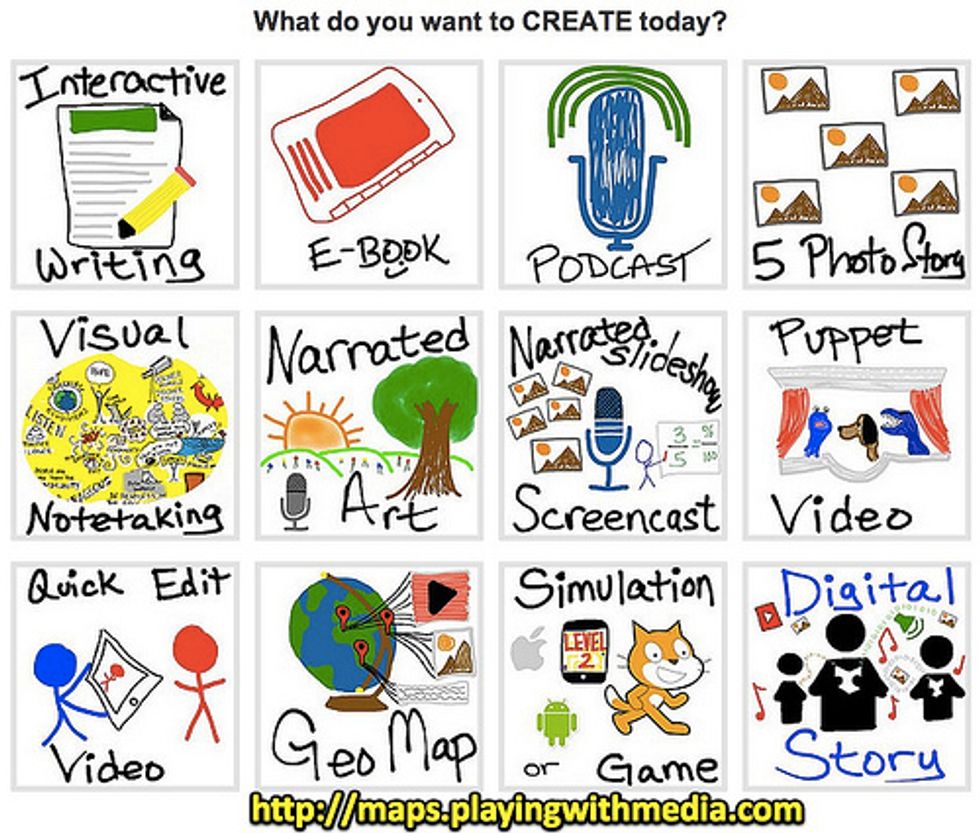Over the next three weeks, I will be giving a focused look into each of the three majors that I have declared at UPJ. What I describe will be based upon the curriculum at the University of Pittsburgh-Johnstown specifically, and it may not line up with the curriculums at other schools. I recommend that students interested in studying Creative Writing look up the curriculums used by the schools at which they are applying/transferring to or that they currently attend.
If one wishes to be more specific, this major is actually a major in Writing with the Creative track, as opposed to the Professional track, selected. There are a good number of differences between the two tracks, and I discuss those here as well.
Both writing tracks require that students take both Intro to Creative Writing and Intro to Professional Writing, preferably early on. I took Intro to Creative Writing my first semester. The course broke down into four genre intros: the play, the creative nonfiction essay, the short story, and the poem. Students wrote a ten-page play, a 1,500ish-word essay, a 1,500ish-word story, and three poems during the semester-long course. The textbook we used gave general insight into each of these four genres. While the information presented was fairly basic, most of it went beyond what one is likely to learn in high school English classes. Intro to Professional Writing followed a similar format, but in that course, which I took my second semester, we worked on an action plan, a review, a press release, a group proposal, and a digital portfolio. While both intro courses differ in content depending upon who the professor is, Intro to Professional Writing seems to contain a more diverse array of possible assignments. When I took the course, I was able to cross-pollinate my professional writing with my creative writing, interviewing a creative writer and editor for my action plan, evaluating an SF magazine issue for my review, covering a YA horror novel for my press release, creating an internal editor-to-publisher document for my proposal (working with a partner), and including stories and story-related materials in my digital portfolio. I gained a great number of new skills in these introductory courses. The intermediary tricks afforded by the classes can aid general writing skills when in the right hands. For the layman, Intro to Professional Writing could be a good choice for fulfilling General Education requirements. Composition II is supposed to be a prerequisite to take either intro course, but Writing majors can get around the prerequisite, at least in cases similar to mine.
Three Tier II English Writing courses are required for majors in both tracks, but the lists are different, with the only overlapping course being Creative Nonfiction Writing. Tier II classes are supposed to be taken after both intro courses have been passed, but that need not always be the case. The list of courses for the Creative track is as follows: Creative Nonfiction Writing, Fiction Writing, Poetry Writing, Playwriting, and Digital Poetry. In Fiction Writing, I was required to write four stories in the range of roughly four to 10 pages. Students also read short stories to glean writing tips directly from examples. Workshops within the class occurred for two class meetings prior to stories two through four reaching their due dates. In Playwriting, students write several short plays. The course is cross-listed with Theatre, so it can be taken as an English Writing class or as a Theatre class, but not as both. My enrollment in Playwriting drastically improved my playwriting skills. In Digital Poetry, the focus is placed on skills and theory a bit more than on simple creation. Making digital poems doesn't have to be difficult, but it does require different sorts of skills than are utilized in other writing classes. I learned how to do some basic coding in that class, for instance. The distinction between "traditional poetry" and "digital poetry" can be difficult to navigate, so time must be spent studying that distinction. What is discovered can, to some extend, expand students' understanding of digital works of all kinds. I took Digital Poetry to fulfill a requirement of my Multimedia & Digital Culture major simultaneously with my fulfillment of a Tier II Creative Writing course. Creative Nonfiction Writing and Poetry Writing I will leave to other students. The personal essay is my least-favorite form of expression, and Poetry Writing would be slightly redundant with Digital Poetry and Advanced Poetry Writing already under my belt. Jumping over to the Tier II Professional Writing courses for a moment, I have taken Writing for Digital Media and may take Public Relations I (which is actually a Journalism course) in the future. The former is a requirement for my Multimedia major, and the latter is an option. Writing for Digital Media is probably the course with the most relevance to laymen (that is, students who don't have a serious interest in a major or minor in writing). It can be adapted to a wide range of talents and pursuits.
As for the third and final tier of writing classes, both tracks again require three courses. These lists are a bit longer, with 13 options for Creative and nine options for Professional. Playwriting can actually be counted as a Tier II or a Tier III Creative Writing course, and the amount of work involved seemed to me to be a good bit higher than that found in the other Tier II classes I've completed. Still, there are other Tier III classes I would like to take. So far, I have only taken Advanced Poetry Writing at Tier III. The course required a lot of poetry reading, and the readings were focused mainly on five books from five authors, rather than a smattering from a bunch of different authors. For the class, we wrote poems and workshopped as we went, and at the end of the course, we turned in a portfolio of seven poems or more. My poem-writing skills improved drastically from this course. In the fall, I will be taking Advanced Writing Seminar. From what I can tell, students in the class choose a genre and write in that the whole way through, with class workshops containing pieces out of any or all genres, depending upon those chosen by the class members. Assuming I am indeed required to choose, I will most likely pick fiction as my genre. Advanced Writing Seminar can currently count as a Tier III class for either track. Rumor has it (straight from professors' mouths), the class will actually be a separate required course for incoming students in the fall. For my third Tier III class, I will select a course that will also help me with my Multimedia major. My top choice, at the moment, is Digital Magazine Production.
In addition to writing classes, both writing tracks require several literature courses. Some schools may offer a major titled "English" rather than separate majors in Creative Writing and English Literature, and those English majors may resemble UPJ's Creative Writing major heavily (though they might also allow for more literature classes than writing classes in fulfillment of the major requirements). English Literature majors at UPJ do not have to take a single writing class to graduate, beyond Composition I and Composition II. Well, it is what it is. Survey of English Lit 2 and American Literary Traditions 2 are required by students of both writing tracks, while Survey of English Lit 1 is also a requirement for Creative Writing majors. These survey courses cover spans of time, and the courses labeled "1" do not need to be taken before those labeled "2." While Creative Writing majors must take two additional English literature electives, Professional Writing majors need only take one. Yet Professional trackers are not home free with two fewer required courses than Creative trackers. A 15-credit related area is also needed to take the Professional track to its end.
Creative Writing was the first major that I declared, back when I applied at UPJ. It has challenged me to expand my writing skills ever farther. At this point, I can at least dabble in most forms of writing. In the end, I will come very close to fulfilling the requirements of both tracks. As you may see, one need not have a one-track mind when studying writing, and with as few required courses as there are for either track, it is very possible to cover both, though I'm not sure if one can actually major in both at UPJ.
I hope that this article may serve to illustrate the content and character of a Creative Writing undergraduate program and that it may aid students who are unsure of what program they wish to declare as their first, second, or third major. I have but one disclaimer: while Creative Writing may be less challenging, on the average, than certain other undergraduate majors, it does require rigorous writing skill and the ability to revise on a high level and quickly. It isn't a simple cop-out by any means.






















